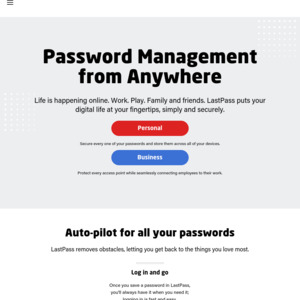I've used LastPass Premium for a while and found it useful when on the go.
Compared to the Free version, Premium basically gives you smartphone access to your password "vault" and a few extra authentication options. See: https://lastpass.com/features_compare.php
Although aimed at University students, it probably will work with any *.edu email address.
Confirmed working with a Monash University student email.
Works for both existing and new LastPass users.
Existing Premium users get an extra 6 months added to their existing subscription.
I'm aware that not everybody is comfortable with storing their passwords online - just throwing it out there for those who may see its utility.




I've been using this for the past 1 year. It's possibly the only software that I carry with me at all times. Simply cannot live without this software after you start using it.